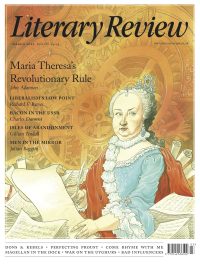Lucy Popescu
Paola Ugaz
In July last year, Pedro Castillo was inaugurated as the 130th president of Peru. So far, he has done little to dispel fears about threats to freedom of expression in the country. Human Rights Watch and other lobby groups remain concerned about the number of journalists facing prosecution for their work under criminal defamation laws. The country’s National Association of Journalists has documented at least 104 lawsuits against Peruvian journalists. It believes that they are being prosecuted for carrying out investigative reporting in the public interest.
Journalists increasingly find themselves up against powerful figures who use the judicial system to curb their reporting. ‘The courts and the prosecutor’s office are being used like whips to silence journalists,’ claims Paola Ugaz, an investigative journalist, editor and writer. She has first-hand experience of this.
In 2015, Ugaz and fellow journalist Pedro Salinas published Mitad monjes, mitad soldados (‘Half Monks, Half Soldiers’), which uncovered the biggest scandal ever reported involving a Catholic organisation, Sodalicio de Vida Cristiana, in Peru. Since late 2018, Ugaz and Salinas have been repeatedly accused of publishing defamatory material in the book. Ugaz has already endured a long campaign of harassment and has faced several lawsuits as a result of her investigations into corruption and physical, psychological and sexual abuse within the group.
PEN considers the lawsuits brought against Ugaz violations of her right to freedom of expression, as well as of her wider civil and political rights. Furthermore, Ugaz has been the target of a smear and disinformation campaign in relation to her work. She has been linked to alleged criminal networks, money laundering, and uranium and plutonium trading, without any evidence. Other intimidatory acts include the publication of private data about her children, who are minors.
Following the announcement that she was writing a new book (yet to be published) about Sodalicio de Vida Cristiana’s financial management, the harassment of Ugaz was ratcheted up and in October 2020, a death threat was sent to her Instagram account. In the same month, a complaint of aggravated defamation filed by Luciano Revoredo Rojas, a former congressional candidate and director of the conservative Catholic news and commentary website La Abeja, led to the opening of a new judicial process against her. In November 2020, Carlos Alberto Gómez de la Torre Pretell, a Sodalicio employee, sued Ugaz for defamation, citing a forty-second statement she had made in an Al Jazeera documentary titled The Sodalitium Scandal.
On 26 January this year, Judge Rómulo Chira of the Ninth Criminal Court of the Superior Court of Lima acquitted Ugaz of defamation in the case brought by Revoredo. She still faces trial for contributing to The Sodalitium Scandal. In addition, the Prosecutor’s Office is now investigating allegations of money laundering made against her by Revoredo and another man, José Edgardo Palomino.
Just two weeks before Ugaz’s acquittal, Christopher Acosta Alfaro, an author and investigative journalist, and Jerónimo Pimentel Prieto, a director and editor at Penguin Random House Peru, were given a two-year suspended prison sentence and ordered to pay civil damages of almost $100,000 after being convicted of aggravated defamation for publishing the book Plata Como Cancha, an unauthorised biography of businessman and three-time presidential candidate César Acuña. This sets a dangerous precedent for journalism and publishing in the country.
Readers might like to send appeals calling on the Peruvian authorities to dismiss all outstanding lawsuits against Paola Ugaz and to immediately cease the judicial harassment she is facing for her work as a journalist, editor and writer; expressing concern about the threats and harassment Ugaz endures in relation to her work, which are clearly intended to stop her investigations and prevent the publication of her books; pointing out the chilling effect this has had on other writers and journalists; and urging the Peruvian authorities to repeal criminal defamation legislation that impedes freedom of expression.
Appeals to be sent to:
Sr Pedro Castillo
President of the Republic of Peru
Jr de la Unión S/N, First Block
Cercado de Lima, Lima 15001, Peru
Twitter: @presidenciaperu
Mrs Zoraida Avalos Rivera
Attorney General of Peru
Email: zavalos@mpfn.gob.pe
Twitter: @FiscaliaPeru
Judge Elvia Barrios Alvarado
President of the Judiciary
Email: ebarrios@pj.gob.pe
Twitter: @Poder_Judicial_
His Excellency Ambassador Juan Carlos Gamarra
Embassy of Peru
52 Sloane Street
London SW1X 9SP
Fax: +44 20 7235 4463
Email: postmaster@peruembassy-uk.com
Readers are encouraged to share concerns on social media, using the hashtag #PaolaUgaz
Update: On 25 January, the Ugandan authorities released author Kakwenza Rukirabashaija (LR, February 2022) on bail, a month after his arrest for insulting the president’s son, on the condition that he and his supporters do not speak to the media. Kakwenza’s lawyer described his health as frail and has alleged that he was tortured in
custody. Readers are encouraged to send messages of support and solidarity: englishpen.org/pen-writes/penwrites-kakwenza-rukirabashaija

Sign Up to our newsletter
Receive free articles, highlights from the archive, news, details of prizes, and much more.@Lit_Review
Follow Literary Review on Twitter
Twitter Feed
The son of a notorious con man, John le Carré turned deception into an art form. Does his archive unmask the author or merely prove how well he learned to disappear?
John Phipps explores.
John Phipps - Approach & Seduction
John Phipps: Approach & Seduction - John le Carré: Tradecraft; Tradecraft: Writers on John le Carré by Federico Varese (ed)
literaryreview.co.uk
Few writers have been so eagerly mythologised as Katherine Mansfield. The short, brilliant life, the doomed love affairs, the sickly genius have together blurred the woman behind the work.
Sophie Oliver looks to Mansfield's stories for answers.
Sophie Oliver - Restless Soul
Sophie Oliver: Restless Soul - Katherine Mansfield: A Hidden Life by Gerri Kimber
literaryreview.co.uk
Literary Review is seeking an editorial intern.